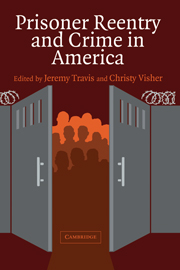Book contents
- Frontmatter
- Contents
- List of Contributors
- 1 INTRODUCTION
- 2 FROM CELL TO SOCIETY
- 3 REENTRY AS A TRANSIENT STATE BETWEEN LIBERTY AND RECOMMITMENT
- 4 THE CONTRIBUTION OF EX-PRISONERS TO CRIME RATES
- 5 DOES SUPERVISION MATTER?
- 6 THE IMPACT OF IMPRISONMENT ON THE DESISTANCE PROCESS
- 7 COMMUNITIES AND REENTRY
- 8 WORK AND FAMILY PERSPECTIVES ON REENTRY
- 9 CONSIDERING THE POLICY IMPLICATIONS
- Index
5 - DOES SUPERVISION MATTER?
Published online by Cambridge University Press: 05 June 2012
- Frontmatter
- Contents
- List of Contributors
- 1 INTRODUCTION
- 2 FROM CELL TO SOCIETY
- 3 REENTRY AS A TRANSIENT STATE BETWEEN LIBERTY AND RECOMMITMENT
- 4 THE CONTRIBUTION OF EX-PRISONERS TO CRIME RATES
- 5 DOES SUPERVISION MATTER?
- 6 THE IMPACT OF IMPRISONMENT ON THE DESISTANCE PROCESS
- 7 COMMUNITIES AND REENTRY
- 8 WORK AND FAMILY PERSPECTIVES ON REENTRY
- 9 CONSIDERING THE POLICY IMPLICATIONS
- Index
Summary
The answer to the question, “Does supervision matter?” is central for designing postincarceration policy for those released from prison. Knowing how much supervision can help and which elements of supervision are efficacious could lead to better outcomes for communities and for recent inmates. The improvement could take the form of reduced criminal offending, the particular emphasis of this book, or other benefits such as reduced substance abuse or better employment outcomes.
Before attempting to answer the question posed by the title of this chapter, it is helpful to be more precise. What do we mean by supervision? This term generally refers to the structured monitoring and support by law enforcement following release from prison, such as “parole supervision.” Even if the term parole has ever been sufficient to describe the various state practices for monitoring ex-inmates in the community, it certainly is not sufficient now. Depending on the state, postincarceration supervision can be provided by parole departments (some of which fall under departments of correction), probation departments, other entities, or some combination of these. The status of being supervised in the community may be the result of a decision by a parole board to offer conditional release for the remainder of the sentence or it may result from the original sentence from the court. The latter is generally referred to as “mandatory supervision.” Those states that “abolished parole” have by and large replaced it with some other form of community supervision, lending yet another dimension of complexity to the nomenclature.
- Type
- Chapter
- Information
- Prisoner Reentry and Crime in America , pp. 105 - 138Publisher: Cambridge University PressPrint publication year: 2005
- 20
- Cited by

